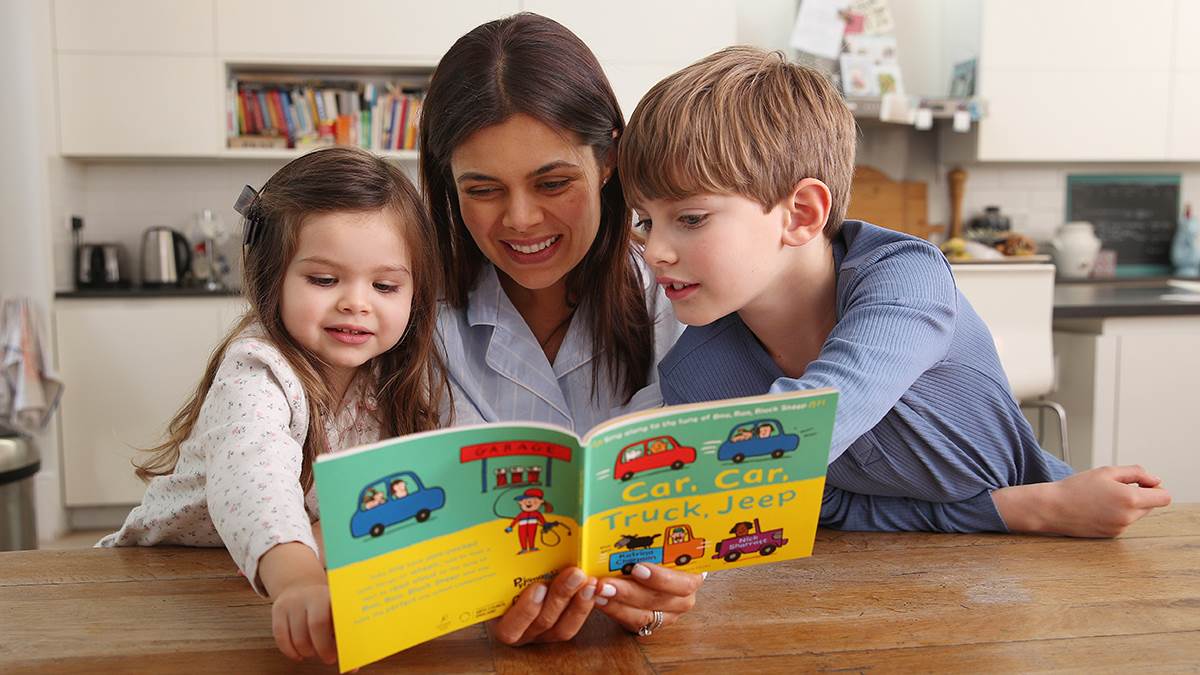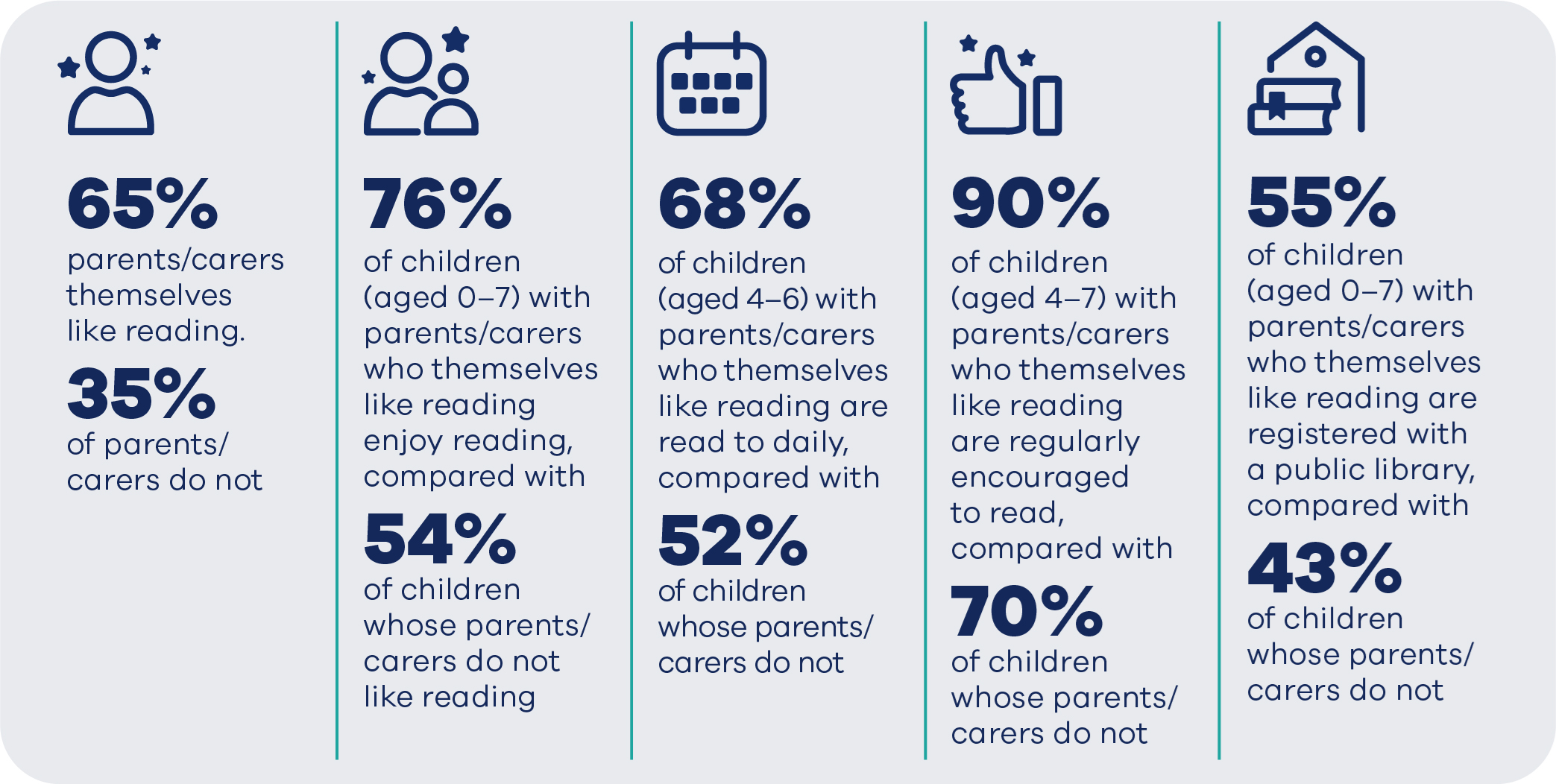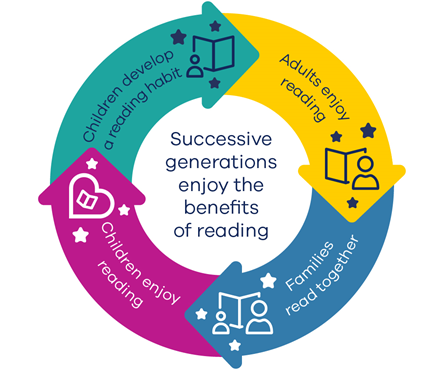Reading in the Early Years: supporting generational cycles of readers
Research with families from low-income backgrounds in the UK

Research shows that reading in the early years brings a wide range of immediate and lifelong benefits that can transform children’s life chances.
Sharing stories with babies and toddlers creates special moments of closeness, shared attention and enjoyment. In turn this supports bonding, positive attachment and wellbeing in families. Children who have regular exposure to books and stories experience important developmental benefits such as improved language skills, social-emotional growth, and creativity.
Our recent research highlights the extent of the influence that parental reading enjoyment has on nurturing generational reading habits. Parents and carers who themselves enjoy reading, open up more opportunities for their children on their reading journeys. These parents/carers foster mutual exchanges of positive emotions when sharing books and stories, which motivate their children to read, and in the longer term, create a generational cycle of enthusiastic readers.
At BookTrust we recognise that child and parental enjoyment of reading are key factors that can contribute to children’s development as readers. And we know that childhood enjoyment of reading is in overall decline.
Building enjoyment of shared reading moments for children and those who can share books and stories with them is at the heart of what we do. Our programmes are designed to create positive, interactive and enriching reading experiences for both children and adults. Working closely with our experienced partners, we provide extra tailored support to families who face more barriers to enjoying shared reading. Our vision is for all families to share books and stories across generations, nurturing generational cycles of reading.

What does this research tell us?
Our research highlights the extent to which parents’/carers’ own enjoyment of reading influences their children’s enthusiasm for reading and the reading habits they develop. Parents/carers who enjoy reading themselves, are more likely to establish early shared reading as an integral part of family life. 59% of parents/carers in this group view reading as a significant part of their family life (compared with 38% of those who do not like reading).
- The emotional quality of shared reading experiences, more than parental reading skills, sparks children’s interest in reading. In shared reading moments, pleasure and positive interactions flow between the adult and the child. Our findings show that parents/carers who themselves like reading, express greater interest in sharing books and stories with their children than those who do not (50% vs. 29%) and find the experience more rewarding (61% vs. 39%).
- These positive feelings enable these parents/carers to deliver emotional warmth, excitement and responsiveness during the times spent reading with their children, which nurture children’s motivation and engagement. 81% of parents/carers who like reading themselves influence their children’s enjoyment of reading, compared with 64% of those who do not.
- Children whose parents/carers enjoy reading themselves are more likely to experience different shared reading activities, including rhymes, storytelling, and book reading. They are also more likely to have access to books, such as through library membership, and to be regularly encouraged by their parents/carers to read.
- Children with parents/carers who like reading themselves are more likely to develop a long-lasting love for reading. At the start of school, 85% of children of enthusiastic readers like reading, compared with 55% of those with parents/carers who themselves do not enjoy reading. And children aged 3–7 who enjoy reading are twice as likely to read independently every day than those who do not (55% vs. 25%). We also know that those read to as children are more inclined to become parents/carers who share books and stories with their own children, perpetuating this cycle across generations.
How we are supporting generational reading cycles
We know that when parents/carers transmit enjoyment of shared reading moments this also makes children more likely to enjoy shared reading experiences. Parents/carers can be motivated to share books and stories when they see their children’s enjoyment. However we understand that some parents/carers who lack confidence in reading and/or experience of being read to as a child themselves, may need extra support to get reading with their children.
At BookTrust we spark family enjoyment through creating fun reading experiences for both children and adults, and through building parental confidence. Working closely with our local delivery partners, we provide non-judgmental guidance and role modelling, helping to reduce anxiety that might make sharing books stressful for some parents/carers. All BookTrust offers, such as our new Bookstart Toddler packs, include attractive, easy to use, and interactive books and activities related to books. These prompt families to engage in reading in ways that lead to parental and child enjoyment and build reading habits.
Expanding Positive Cycles: Our research highlights opportunities to expand generational reading cycles. Many children are read to by several people in their lives, including grandparents, siblings, and teachers. The more people in a child’s life who share books and stories with them and transmit a love of reading, the stronger the generational cycles of building future readers become.
BookTrust resources are designed to be used and enjoyed by multiple ‘reading influencers’ in a child’s life. Our digital resources for families show grandparents and siblings enjoying shared reading moments, to raise awareness of how other ‘reading influencers’ can support children on their reading journeys.
Addressing Negative Cycles: Our research reveals specific barriers to creating strong generational reading cycles. It shows, for example, that parents/carers tend to be more positive about sharing books and stories with their daughters than with their sons, and that boys are less likely to be read to regularly than girls. Many parents/carers report that their sons quickly lose interest in reading or are “too active to sit down and listen to a story”.
In BookTrust offers and messaging we reassure families that there is no right or wrong way to read, and that children can actively engage with a story whether through play, with actions, on the move, or outdoors. Our BookTrust Storytime library offer, for example, is designed to challenge parents’/carers’ concerns that children should sit and be quiet when enjoying books in libraries.

